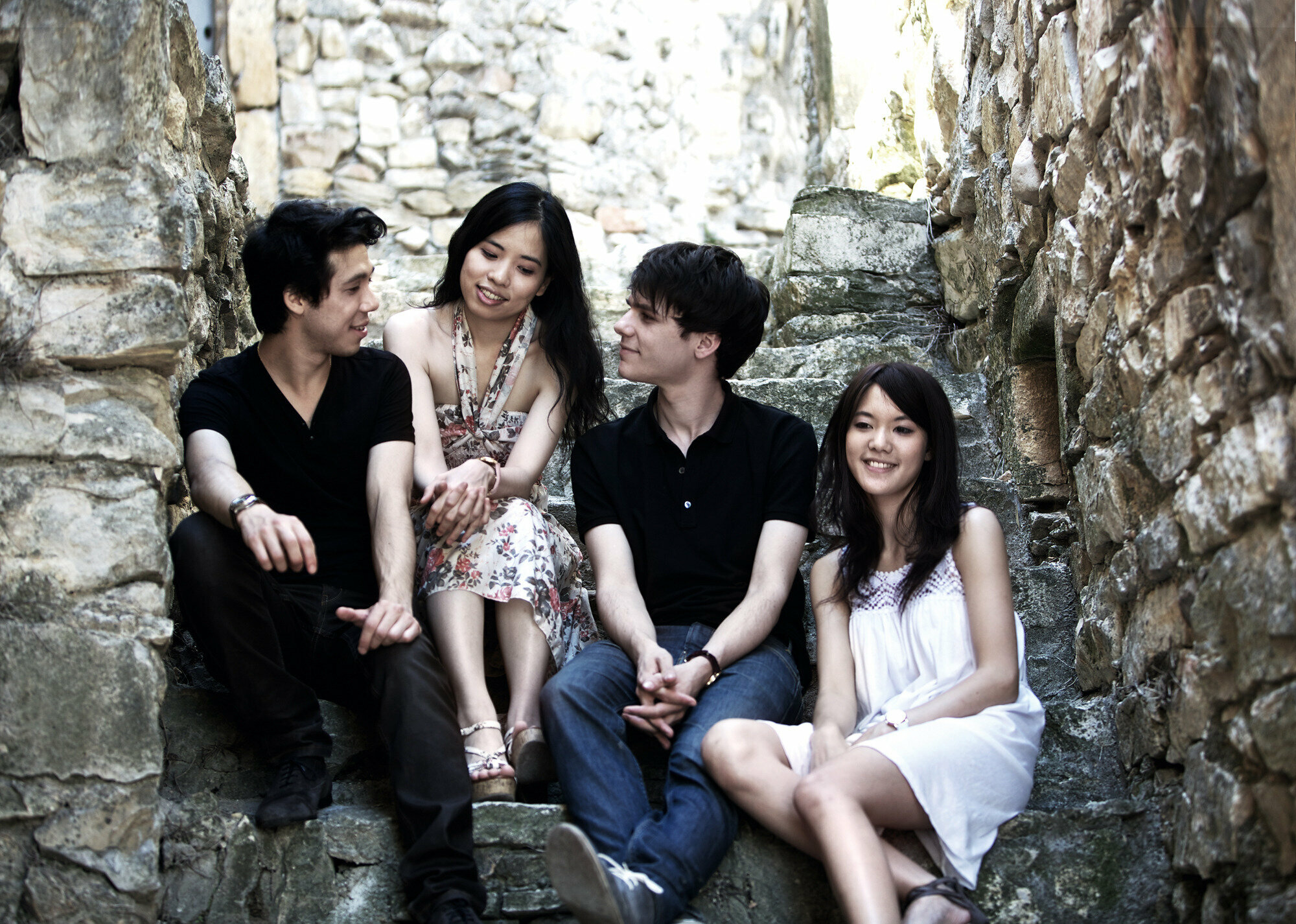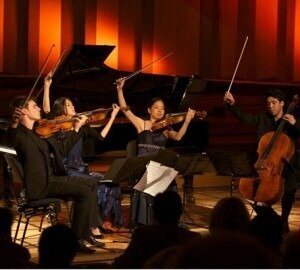
Credit: www.yca.org
What inspired your formation?
We all studied at the same school of music in Lyon (CNSMD de Lyon) and the string quartet was part of our music studies – we took a string quartet class in our school. We met totally by chance and did some readings together. We naturally felt the same sensibility, breath and harmony between us, so we started to play together, at first for fun and for the love of sharing music together. After our first string quartet competition in Lyon and meeting Quatuor Ysaye, we really decided to commit to the quartet professionally.
How do you rehearse? Is it led from the first violin, or is it more ‘democratic’?
We rehearse every day, normally for about 4 hours per day, also allowing time for our individual practice. Of course there is no ‘lead’! We could say there are 4 leaders … we try to be democratic and that’s the most interesting part of the string quartet: to discuss music and have different opinions! A string quartet is a dialogue between 4 personalities – sometimes we have to be ‘one instrument’ and sometimes 4 voices.
What happens if there is an ideological conflict in a rehearsal?
We always try everything even if we don’t agree! We all have our own ideas of phrasing and so on, but we discovered that it’s quicker to play and try others’ ideas rather than talking too much. And if we really don’t find a solution or compromise, we just leave the idea for the moment, work on another passage or piece and think about it at home.
Are there any composers that you prefer to play (as a quartet)? Do you have a favourite piece? If so, why?
It’s always difficult to say one composer! The string quartet repertoire is really huge and there are so many great pieces! Among everything, we really like to play Haydn; Haydn is the ‘father of the string quartet’ and his music is incredibly human and simple – we always feel close to him when we play his quartets.
I see you recently released an album. Are there any more planned?

Credit: ars.rtvslo.si
Tell us more about your tour to China. Is this your first time (in China)?
We are really excited for our trip to China! It’s the first time there for everybody and it’s always nice to discover a country we’ve never been to before. We’re giving concerts in Beijing, Tianjin, Guangzhou, Kunming and Chendu, but we don’t know if we will have time to do any sightseeing – we’re only staying for 10 days and we have to keep working for concerts… But in Beijing we’ll play at the Forbidden City, and hope to have time to look around!
In particular, what influenced your choice of programme?
Firstly, we chose one of Schumann’s string quartets (No.1) because we particularly love to play this romantic, passionate and beautiful music. We also thought that it’s good experience and an opportunity to get to play it many times in a concert in preparation for our recording after the Chinese tour in June. Janacek’s second string quartet ‘Intimate Letters’ is one of our favourite string quartets; it’s incredibly rich modern music, and we were fascinated when we listened to this music for the first time in a concert… And among the two romantic and modern pieces, we decided that we needed a more ‘classical’ piece, and that’s why we chose Mozart’s quartet in D minor K421, very deep and a bit dark.
Do you think chamber music will be received any differently by a Chinese audience than a Western audience (given that the majority of Western ‘classical’ music performed in China is orchestral)?
We hope that the Chinese audience will enjoy our performance! During our worldwide tour, we felt there was always a different audience atmosphere in each country, but our strong desire is to bring our identity and our musical feeling from the composer to the public.
With your venues, will there be any chances to talk to the audiences, and will you be giving any masterclasses/open rehearsals?
We just have received our complete schedule and unfortunately this time there are no opportunities to give masterclasses or open rehearsals in China … But when there is a possibility, we like to share our experience with people! We did lots of masterclasses with young musicians and question/answer sessions during our American tour last year, which was a very fun and interesting experience for us!
What are your plans for the future?
Most importantly: to stay together! And continue to play concerts worldwide, share music with different people, different audiences and different cultures !
Official Website
Debussy




